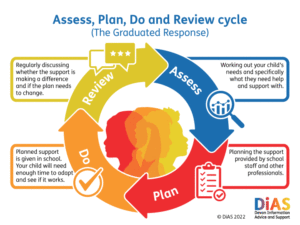In reality, only a few children have an EHC needs assessment and plan. For every four children in England with special education needs or a disability (SEND), one will need an EHC plan and three will not.
Most children and young people with SEND go to a mainstream nursery, school or college and are supported by their staff, resources and funds. Teachers and other professionals regularly review how a child or young person is getting on and support them to learn, develop and feel safe. This is called special educational needs support or SEN support.

SEN support in nurseries, schools and colleges is based around the specific needs of each child or young person. The staff, equipment, resources and support that help your child are decided using something called the graduated approach. This is an ‘assess, plan, do, and review’ cycle. That means if your child special educational needs, the school or college should:
Information about your child’s needs, support and goals should be written down in a plan, which is used by staff and updated regularly.
Schools and colleges use all kinds of plans and have different names for them. So, your child’s plan may look different from one for a child from a different school. What’s important is that your child has a clearly written plan which lists all their needs, support and goals. For most children and young people with SEND, the support the school gives works and they make progress.
But sometimes the support for a child isn’t enough or isn’t right. Your child may not make the progress that’s expected and start to fall behind other children their age. Or their difficulties in school get worse not better, and their behaviour at school or home becomes more challenging.
If things aren’t going well for your child and they’re not making progress, your first step is to ask for a meeting to review their nursery, school or college plan. At the meeting you can talk about the support they’re getting, what may need to change and how you’ll know if any new support is working.
It’s also important to talk to your child and find out how they feel about school, including what is working and what is not and what could help to make things better. There are lots of ideas and tools on our website to help you have those conversations.
If reviewing the plan and making changes to the support doesn’t make a difference, you can ask whether a needs assessment for an Education Health and Care (EHC) plan should be the next step.
You can find out more about the support that’s available in schools on the Devon SEND Local Offer pages.
No. All schools and all school and academy sixth forms, sixth form colleges, further education colleges and 16-19 academies have funding for children with SEND. Early years settings such as nurseries can also get extra money to support a child with SEND.
Your child doesn’t need an EHC plan to get funding and support in nursery, school or college.
You can find out more about funding for children and young people with SEND on the website.
EHC plans are for children or young people aged up to 25 with special educational needs (SEN) who need more support than can be given through SEN support in their mainstream nursery, school or college.
An EHC plan is a legal document that describes your child or young person’s
It explains
EHC plans are made by a local authority after an EHC needs assessment. A plan can include your child’s health or social care needs as well as their educational needs, but they won’t get a plan if they only have health or social care needs that don’t affect their education. Your local authority (LA) must make sure that your child or young person gets the educational support and any social care support that’s in their plan. The local Integrated Care Board is responsible for any health support in it.
One of the main aims of an EHC plan is to give a child or young person support that helps them achieve the best possible results in their journey towards adulthood. It may seem like a long way off, but even from early years the support set out in a plan should challenge a child to become as independent as possible. This means taking small regular steps towards developing the skills they’ll need for adult life.
An EHC plan is made up of information given to the local authority by
The plan should
The SEND Code of Practice is the legal guidance about special educational needs and disability (SEND) support for local authorities to follow. It gives a detailed list of what should be in an EHC plan. The Council for Disabled Children also has a guide to good examples for the different parts of an EHC plan.
Parents, young people and schools can all ask the local authority for an EHC needs assessment. Ideally it makes sense for everyone to support the application for an assessment and work together.
However, sometimes professionals believe a child does not need an EHC plan or that they would not get a needs assessment. If that happens, and the professionals do not want to support an application for assessment, then you could try meeting to see if you can agree. If you want to go ahead yourself, you can also ask for a needs assessment without the support of school or college.
It’s worth remembering that having an EHC needs assessment doesn’t always lead to getting an EHC plan. The information that’s collected as part of an assessment may show ways that the school, college or other provider can meet your child’s needs without an EHC plan.
Page reviewed: April 2024
Page due for review: April 2026
DiAS (Devon, Information, Advice and Support) supports children and young people aged 0-25 with special educational needs and disabilities (SEND), and their parents and carers.
Helpful links
Contact us
Legal
© 2025 Devon Information Advice & Support
Searching...